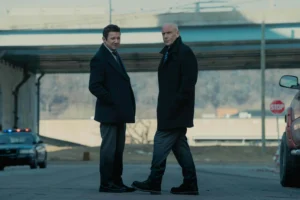Summary
Despite the single tone running through the film, it is worth watching because Sentinelle is tightly packed in 80-minutes, meaning the lack of range in the story suffers less. This is a thematic revenge thriller that needs more script.
Near the start of the film, it describes “Operation Sentinelle” — a group of soldiers serving as an anti-terrorist guard in various locations in France; they are there to watch and protect. The lead character, Klara (played by Olga Kurylenko — as seen in Gun Shy, Mara, The Bay of Silence), is assigned to this unit after a traumatic combat mission overseas.
The story imagines a life of PTSD with an overwhelming struggle to adjust, even with the comforting embraces of a mother and a delightful sister — Sentinelle focuses heavily on that emptiness that follows trauma.
The film suggests that “Operation Sentinelle” means quiet duty and non-eventful, especially as Klara follows her unit in the peaceful parts of France — it’s that peace where her trauma sticks out like a sore thumb; it’s too normal. The Netflix film can be praised for understanding that angle for those returning from overseas.
Once the French film bases the story on PTSD, the real objective comes — after a night out, Klara learns that her sister was brutally raped and has ended up in a coma. The police have their hands tied — the perpetrators have diplomatic passports, consulate villas and are highly regarded due to their wealth and status.
Due to her combative skills and marksmanship, Klara spends the rest of the film finding a way to seek revenge — it’s Taken but far grittier and more sombre, and adds to the rape-revenge film catalogue.
Olga Kurylenko does well to hold Sentinelle as her own as there’s barely a supporting character — the actor flagrantly took on this project so she can shine in her own light. She embraces the action set-pieces, plays a suffering soldier well and sells the character.
There isn’t much dialogue, but Olga expresses Klara’s feelings effectively — the audience understands she’s in pain. There’s an odd sense of irony that “Operation Sentinelle” was not cutting it for her; that it does not appease her purpose — the rape of her sister gives the lead character that purpose, and I am not sure if that was the angle director Julien Leclercq (also behind Earth and Blood, The Wages of Fear) was looking for. Audiences will enjoy the one-track mind approach for revenge.
Sentinelle is too repetitive with tone and relies on the gloominess of the story, which means audiences grab on the action for stimulation; despite the eagerness to have one central character, Klara would have benefitted from a supporting role to complement her; even scenes where her mother strokes her hair felt like an inkling for the audience to understand her more; that she needed comforting and protecting.
Sometimes less is more, but the French film needed more. Olga Kurylenko is screaming for the script to allow her more range, which explains why she makes up for it in the scenes she has.
Despite the single tone running through the film, it is worth watching because Sentinelle is tightly packed in 80 minutes, meaning the lack of range in the story suffers less. This is a thematic revenge thriller that needs more script.
Read More: Sentinelle Ending Explained




